Search
Showing 10 of 1007 results for gabrielaaa06302 of
-
New Zealand providers show global leadership at NAFSA 2025
Education New Zealand Manapou ki te Ao (ENZ), alongside representatives from eight tertiary providers wrapped up a high-impact week at the NAFSA 2025 Annual Conference in San Diego at the end of May.
Under the conference theme ‘People, Place and Partnership,’ New Zealand’s delegation was in amongst over the 8,000+ global education leaders, strengthening institutional ties and driving new collaboration opportunities.

Representatives from the University of Auckland connecting with conference delegates in the New Zealand pavillion.
The New Zealand pavilion comprised of University of Auckland, Auckland University of Technology, University of Waikato, Massey University, Victoria University of Wellington, University of Canterbury, University of Otago and Whitecliffe College.
ENZ Chief Executive, Amanda Malu, said being present at the world’s largest international education conference is not just about visibility—it’s about leadership.
“New Zealand’s education providers have a unique perspective to offer the global education community, and NAFSA is where those voices can shape conversations, forge partnerships, and spark ideas that transcend borders,” she said.
ENZ worked with NAFSA to host two sessions in the New Zealand pavilion. Both sessions were well attended, sparking discussions among conference delegates about reimagining higher education.

The University of Waikato panel session. From L to R: ENZ Director of Engagement, DuBois Jennings; Unviersity of Waikato Deputy Vice-Chancellor Māori, Dr. Sarah-Jane Tiakiwai; University of Waikato Associate Director Global Experiences, Jaydene Meadows and ENZ Acting Regional Director, Natalie Lulia.
The first session moderated by ENZ Director of Engagement North America, DuBois Jennings, featured a panel discussion titled ‘Te Ao Hurihuri Indigenous Internationalisation: Perspectives from Te Whare Wānanga o Waikato – The University of Waikato’. The session explored the concept of indigenous internationalisation, focusing on the unique approaches and programmes delivered at The University of Waikato. On the panel was Deputy Vice-Chancellor Māori Dr. Sarah-Jane Tiakiwai, Associate Director, Global Experiences Jaydene Meadows from the University of Waikato, and ENZ Acting Regional Director, Natalie Lulia.
Associate Director of Global Experiences Jaydene Meadows said the outcomes for the University of Waikato well surpassed previous years at the conference.
“This year was significant for us, deepening the roots of current relationships, while promoting new programme offerings and working to develop new business opportunities.”
The University of Otago presented the second session titled 'Indigenising our university’s name and brandmark: Ōtākou Whakaihu Waka | University of Otago'. Deputy Vice-Chancellor, External Engagement Professor Jessica Palmer and Manager, Indigenous Internationalisation, Karamea Pēwhairangi reflected on a year since the global launch of their new brandmark, the journey to being gifted a Māori name, and how the University of Otago includes indigeneity in the University’s Internationalisation Strategy.
ENZ Acting Regional Director Natalie Lulia said both sessions showcased New Zealand’s unique approach to education that integrates indigenous knowledge, and she looks forward to building on the momentum of the conference.
“NAFSA certainly set the ball rolling for increased student mobility, enhanced research linkages, and stronger people-to-people connections between New Zealand and our international partners,” she said.
-
New Zealand Global Competence Certificate programme proves a hit
What is New Zealand’s Global Competence Certificate programme?
The customised cultural exchange programme, which started as a pilot partnership last year between New Zealand’s international education agency, Education New Zealand Manapou ki te Ao and AFS Intercultural Programs, Inc. has proved so successful it is now being extended and taken up by schools and tertiary institutions around the country, connecting them with students in Asia and Latin America.
The “Kiwi way” has much to offer the world, and international education has much to offer New Zealanders at a time the world needs people with cross-cultural competencies. The New Zealand Global Competence Certificate, delivered through Massey University, develops cultural self-awareness, emotional resilience, and build bridges across cultures. It also piques the interest of students offshore in coming to New Zealand in better times.
The programme delivers animated videos, quizzes, assignments, and weekly live facilitated dialogue sessions for learners to talk with each other online in real time and learn about life from perspectives other than their own.
What have students been saying about the NZGCC programme?
“Not only have I learned to become a better communicator, empathiser, and global citizen, but also how a group of like-minded individuals can come together to form something bigger,” says Jack Hittle, of Northland’s Springbank School.
“I found the programme life-changing,” says Vaagisha Kanwar, a Year 11 student at Indus International School in Bangalore, India, who connected with the Northland students. “We learned about conflict, empathy, inequality, different communication styles, how different people adapt to new situations, and about suspending judgement. I know that I’ll use the skills we’ve learned for the rest of my life, not just when I travel abroad but also in daily life.”
"You see the way a culture greets each other or the way they dress, but then there are things like relationships, gender roles, and health,” says Whanganui Girls College student Tilda Donson.
What have educators been saying about the NZGCC programme?
Whanganui Girls College Principal Sharon Steer is delighted with the NZGCC programme, which she says will help students build their understanding of global cultures, and other critical “soft” skills which will prepare them for life as they enter the workforce.
“An important part of our curriculum is developing strong communication skills and setting our students up for success in the workplace. The NZGCC programme will add another dimension to our lessons by teaching our students how to develop meaningful relationships with one another despite language and cultural differences.”
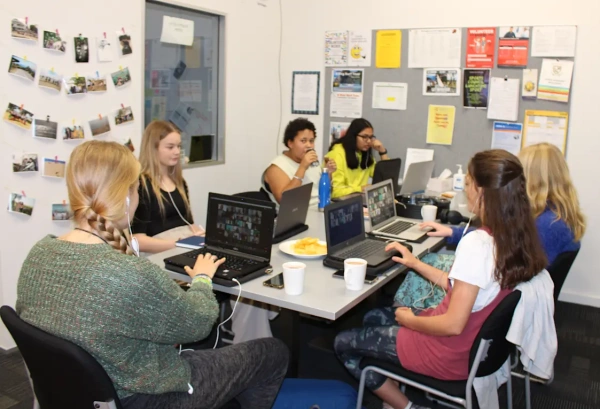
Educators say that with the borders closed, the programme now forms an important part of the reshaped international education experience.
“It is so important that our students don’t miss out on the enriching life skills that are gained when we interact and connect with people from around the globe,” says Whangarei Girls High School International Director Amelia Morrison, who has students working with peers in India.
"Global competence is mission-critical for our world," says AFS Intercultural Programs President and CEO Daniel Obst. “Educating more young people to become global citizens is crucial if we want to create a more just and peaceful world.”
The expansion of the GCC programme reflects the diversification of education in new virtual forms fit for a globally connected world, says Education New Zealand Chief Executive Grant McPherson.
“As well as helping to develop the global citizens of tomorrow, this programme demonstrates the reciprocal benefits of international education, giving our rangatahi a chance to learn with high school students from around the world, and giving their offshore peers a chance to learn ‘with’ New Zealand and our unique way of thinking.”
-
New Zealand and China share cultural connection through conservation
In many ways New Zealand’s management of protected lands is world-leading, but there is still much to learn from others. Collaboration is key to improving outcomes and shaping policy in the years ahead. Dr Mick Abbott, professor of Landscape Architecture at Lincoln University, has been collaborating with researchers in China since 2014, with support from Education New Zealand’s Tripartite Fund. The fund assists New Zealand universities to join in research partnerships as the “Third Brother” with two Chinese Universities - one “emerging” and the other “established”.
Dr Abbott has been working with Tsinghua University in Beijing and Kunming University of Science and Technology in Yunnan province on research projects, field trips, workshops, student courses, and the production of bilingual learning materials.
“While we achieve very good conservation outcomes in New Zealand, it is essential that we look beyond our borders for further research and understanding” - Dr Mick Abbott, WildAtlas project lead and Tripartite Fund recipient
Need to look beyond our borders
“Conservation underpins our value proposition to the world,” he says.
“While we achieve very good conservation outcomes in New Zealand, it is essential that we look beyond our borders for further research and understanding.”
While China looks to New Zealand for leadership on how to effectively protect pristine environments from the impacts of recreation and tourism, New Zealand stands to learn a lot from how China celebrates its cultural connections with nature, Dr Abbott says.
“Protected lands in China are associated with cultural value. In Chinese thinking ecological civilisation underpins wider civilisation. They take a holistic view and there are elements in common with Mātauranga Māori (Māori wisdom and world view).
Cross-cultural thinking important
Mātauranga Māori can enhance the cultural connection between Maori and Chinese and creates valuable synergies, he says. “Cross-cultural thinking is so important.”
Key to the success of the long-term relationship was an exhibition Lincoln University curated in Beijing in 2017, showcasing New Zealand’s protected areas and a range of eye-catching exhibits, alongside Lincoln’s research and that of Tsinghua University on the future direction of protected area management.
The exhibition attracted 50,000 visitors and kicked off the WildAtlas project which Dr Abbott has spent the past four years developing. WildAtlas is a collection of virtual tours that bring to life the stories of New Zealand’s National Parks and protected areas, both past and present.
Available in both English and Chinese, WildAtlas is principally used as an educational tool aimed at university students, but Dr Abbott would like to extend its reach to Year 12 and 13 students. “Land issues are really important in this country, and we must understand there are other ways to view the land. We need to broaden the horizons of our students.”
Conservation experiences a key attraction
Looking to the future, Dr Abbott says that New Zealand conservation managers will benefit from a better understanding of the type of National Park experiences that are attractive to Chinese visitors.
“Pre-Covid, China was New Zealand’s second largest inbound tourism market and largest long-haul market. Our conservation areas and national parks are a key attraction.”
He is using the latest round of Tripartite funding to create a corresponding Virtual Field Tour of the Protected Areas of Yunnan Province, home to Kunming University of Science and Technology.
Dr Abbott is hugely positive about the relationship which has been built with Tsinghua and Kunming universities through the Tripartite Fund and believes the collaboration will lead to business and investment opportunities in the future.
“We must foster goodwill and understanding first, share our values, and advocate for them.
Editor’s note: New Zealand’s involvement in the Tripartite Fund dates back to 2005, when the New Zealand and Chinese Ministries of Education agreed to formally support and promote tripartite relationships between New Zealand and China, in which a New Zealand university is joined as the ‘third brother’ to an existing ‘two brothers’ arrangement.
For more information on the NZ-China Tripartite Fund or to learn more about Professor Abbott’s research, please contact the ENZ team at china@enz.govt.nz
-
Stronger together: TNZ and ENZ support school sector growth through agent famil
The week-long programme brought eight agents from mainland China, Hong Kong, and Taiwan to Wellington, Marlborough and Canterbury.
The aim was to give agents first-hand experience of New Zealand’s short-term study offerings in schools, strengthen connections with regional education providers, and explore opportunities to develop tailored study tour programmes.
The famil was funded by TNZ, with ENZ collaborating with Schools International Education Business Association of New Zealand (SIEBA) to manage the itinerary and logistics.
ENZ Senior Market Development Manager (China), Felix Ye, and TNZ Trade Development Manager (Greater China), Sandy He, led the delegation of eight agents - providing on-the-ground support and sector insights.
In the year ended December 2024 New Zealand exported $1.29 billion of education related travel to China. This represented 35.8% of all exports of education related travel. For trade in education related travel China, People's Republic of ranked 1 of 140 for highest export value. [1] According to data from Stat NZ, 7.9k Chinese students holding visitor visas came to New Zealand for short-term programmes or study tours - the majority visiting during China’s school holidays in July. [2]
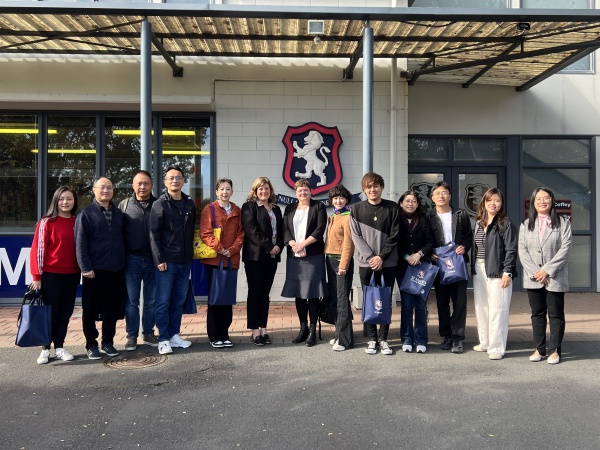
The agents visited St Mark’s School in Wellington, meeting with Erica Harrison, the Acting Principal, and her team.
The agents met with 15 schools across the three cities, including a mix of private, state-integrated, and single-sex schools. The journey began in Wellington with a warm welcome at Rāroa Normal Intermediate, where the group received a traditional mihi whakatau — a first-time experience for many.
Deputy Principal Dave Gillies said it was a great opportunity to showcase the school’s experiential learning focus.
“We’re excited about developing professional relationships with the agents and the opportunities that will grow from this visit,” he said.
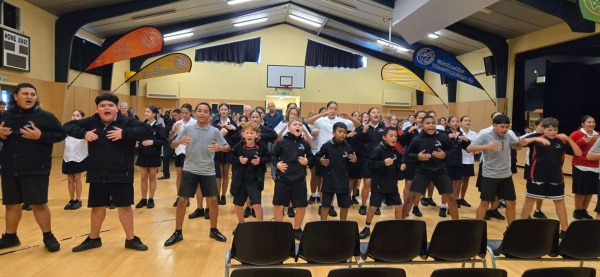
Students from Chisnallwood Intermediate School perform a haka to welcome the group to the school.
In the South Island, the group explored a range of school offerings and regional initiatives.
In Blenheim, agents gained insights into the unique characteristics of state-integrated education at Richmond View School, Marlborough Boys' College, and Marlborough Girls' College.
In Methven, Mt Hutt College showcased its tailored short-term programme, featuring sustainability-focused tourism at Ōpuke Thermal Pools and hands-on alpine and agricultural experiences – a creative integration of local resources into learning.
The famil concluded in Christchurch, where SIEBA and Christchurch Educated gave overviews of the New Zealand school system and introduced how their initiatives support the growth of international education across the sector.
ENZ Regional Director of Greater China, Dr Ron Xavier, said study tours are a growing area of interest among Chinese agents.
“This famil gave a genuine sense of what New Zealand schools can offer — from cultural experiences to hands-on learning — and helped connect agents with educators who are eager to host students,” he said.
ENZ and TNZ plan to work closely with participating partners to develop new study tours across different regions for 2026, helping raise awareness of New Zealand as an education destination for Chinese students.
SIEBA Executive Director, John van der Zwan, is looking forward to experiencing the benefits of the study tour famil.
“Study tours have significant potential, we look forward to the outcomes of this famil increasing the exposure of New Zealand’s regional schools in the China market,” he said.
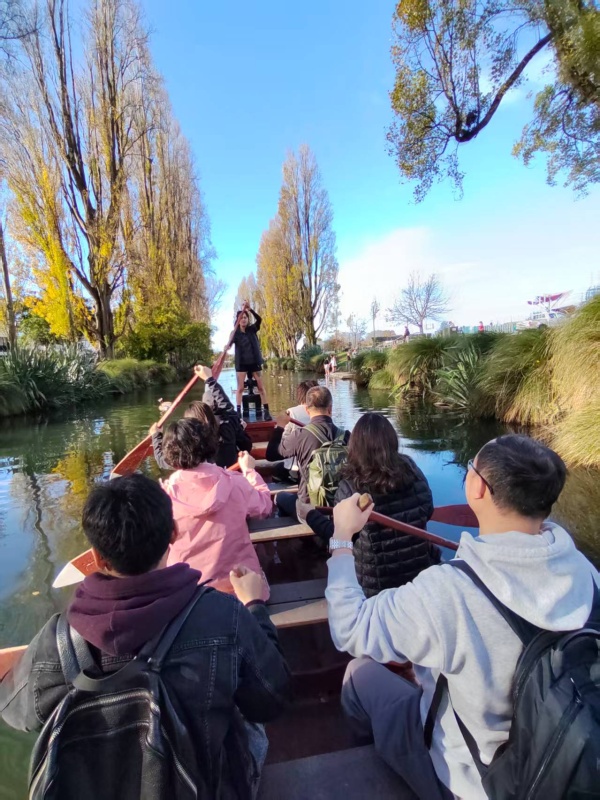
Paddling a waka on the Avon River. Beyond education, the famil also highlighted New Zealand’s unique culture and natural beauty. From visiting Te Papa and Wētā Workshop to paddling a waka on the Avon River in Ōtautahi Christchurch, agents experienced the blend of tradition and innovation that makes New Zealand a compelling destination.
[1] Tourism data | Corporate and Stats NZ
[2] https://tourismnewzealand.com/insights/tourism-data/
-
New Zealand ready to lead students to a more sustainable future
Research commissioned by Education New Zealand in May found that 79 percent of participants were interested in studying sustainability and climate change. And the 2019 QS Environmental Concerns Survey of 3700 prospective international students from around the world found that more than 75 percent would be more likely to choose a degree if the content helped them learn about reducing their environmental impact.
New Zealand is often viewed as a progressive nation delivering new solutions to problems while at the same time valuing people, place, and planet. Our world-class education system prides itself on preparing graduates with the practical skills and innovative thinking sought by future employers. Those skills must also now empower them to address issues of global consequence.
Tertiary education providers boost sustainability education options
New Zealand tertiary education providers are playing an increasingly important role in shaping this enthusiastic generation of learners, with many institutions incorporating a sustainability focus into their research and in many of the courses they offer.
Waikato University has gone one step further, announcing it will offer the world’s first Bachelor of Climate Change degree from next year. The three-year course will take a multi-disciplinary approach combining science, economic, social, and political systems, plus mātauranga Māori (Māori knowledge and wisdom).
“We all agreed that science alone can’t come up with all the solutions,” says Dean of Science Professor Margaret Barbour, one of the key players in the development of the programme. “We need people who can think across knowledge systems.” She is enthusiastic about the contribution international students will make, working alongside domestic students.
“International students will broaden our perspectives. They will bring new ideas from their home country and that can only be positive because climate change is a global issue,” she says. “The whole world needs to work together on this. We can’t be constrained by national boundaries.”
“Very soon New Zealand, and the world, will have these graduates who will have a thorough understanding of climate change and the impacts on environment and people, and they’ll be able to think critically and holistically,” says Prof Barbour. “They will have expertise in a particular area related to climate change, but they’ll also have the ability to engage with cultural competency outside their area of expertise.” Whether it’s about protecting our land or our oceans, Aotearoa New Zealand is making its mark. While there is still much work to be done, learners are looking our way for both leadership and collaboration.
Students choose New Zealand for sustainability studies
German PhD student Alexandra Lischka has travelled the world for her research in marine biology but says she chose New Zealand for her doctorate studies because it offered her the opportunity to work with internationally respected marine scientists across three universities.
“There are so many problems facing our marine environment, and I want to help solve them. The old ways of thinking aren’t working when it comes to solving some of the biggest problems facing our oceans. I know I need to forge another path if I want to make a difference.”
Heinrich Blass came to New Zealand from Germany to learn more about sustainable and ecological building practices. He chose to spend two semesters last year taking Building Science courses at Victoria University. “I was able to learn a broad approach to sustainable concepts from design to building technology and engineering systems to green building certification,” he says. “This gave me a deep insight as well as extensive expertise in sustainable building.”
International education experience takes New Zealand thinking to the world
In 2019 and 2020, Auckland University topped 850 institutions from 89 countries in the Times Higher Education Impact Rankings which assessed universities against the 17 United Nations’ Sustainable Development Goals across research, outreach, and stewardship.
Vice-Chancellor Professor Dawn Freshwater says the ease of access to oceans and land provides a “natural emphasis” for environmental research. This, combined with the value placed on kaitiakitanga (guardianship) and mātauranga Māori helps to shape “a unique and distinctive approach to sustainability in this country”.
For students who seek a brighter future with a lighter footprint, an international education experience in New Zealand will take our thinking to the world, open pathways to collaborate on global causes, and help make the world a better place.
Mō tātou te taiao ko te atawhai, mō tātou te taiao ko te oranga.
It is for us to care for and look after the environment to ensure its wellbeing; in doing so we ensure our own wellbeing and that of future generations.
-
New Zealand-trained astrophysicist receives top honour in Malaysia
She was awarded the prestigious Commander of the Order of Loyalty to the Crown of Malaysia, by Sultan Abdullah at his annual Honours ceremony. It carries the title of Tan Sri, one of the highest federal titles, and is only held concurrently by 250 living recipients.
Dr Othman studied physics at the University of Otago in the 1970s and returned for post-graduate study in the 1980s, becoming the first woman to graduate from the university with a PhD in Astronomy and Astrophysics. She then went on to forge a remarkable career in the male-dominated space industry.
Colombo Plan Scholar
Dr Othman came to New Zealand on a Colombo Plan scholarship. The Plan, a forerunner to our modern development assistance programmes, aimed to promote economic and social development in Asia through education and training.
Having fallen in love with physics as a teenager in the 1960s, Dr Othman didn’t discover astronomy or astrophysics until she arrived in Dunedin to study for her PhD in 1974.
“There were very few books available at that time and there was not much interest here in Malaysia, but it was very different in New Zealand,” she says. “Neil Armstrong’s landing on the moon in 1969 was a very significant event, but I didn’t think at that time that I would have space as a career. Not in a million years.”
Studying in New Zealand opened a world of opportunity for the young, Muslim scholar. Not only did she make a career in the space industry, but she became a leading authority, being appointed the Director of the United Nations Office of Outer Space Affairs in 1999, and the founding director of Malaysia’s National Space Agency in 2002.
She acknowledges it has been challenging at times. “It’s been a hard road because I’ve had to start everything from scratch. There was no set path to get to where I am today.”
Working to promote science and technology
She says her role at the UN was less about science, and more about diplomacy and politics. “How to balance one country’s requirements against another’s. Bringing people to the table together, even if they don’t agree, to try and agree on how to proceed. The other aspect of the job was to see how we could use space to enhance the development of developing countries, especially in science and technology.”
It is mostly her work at home for which she has been recognised by the King. As Malaysia’s first astrophysicist, Dr Othman was instrumental in introducing astronomy and space sciences into school and university curricula, advised the Government on space matters, was the driving force behind the National Planetarium in Kuala Lumpur, initiated the country’s National Microsatellite Programme, and headed Mega Science 3.0, the ambitious project to transform Malaysia into leading global player in science and innovation by 2050.
Justice and fairness in New Zealand education
But it all started as an international student in New Zealand, a time Dr Othman remembers as being both liberating and rewarding. “I particularly loved the egalitarian environment of the university, and that reflected wider New Zealand society.”
“There will always be a role for New Zealand in supporting education internationally through its cultural perspective on science,” she says. “There is no hierarchy in New Zealand science – professors treat their students as equals and encourage them to challenge and ask questions. That approach has stayed with me through my career.
“New Zealand education also instils a deep sense of justice and fairness.” – Malaysia alumna and astrophysicist Dr Mazlan Othman.
-
Incheon Metropolitan Office of Education deepens links in New Zealand
The delegation from Incheon Metropolitan Office of Education East Asia Global Education Institute (Incheon MOE) travelled to Ngatea, Wellington, Canterbury and Otago – visiting providers from the schools, university and vocational education sectors.
The visit began with a visit to Ngatea to connect with Hauraki Plains College and Ngatea Primary School.
Observing the Agriculture Academy and trades-based courses at Hauraki Plains College.
A key aspect of the delegation’s time in Ngatea was the signing of a Memorandum of Understanding (MoU) between Hauraki Plains College and four schools from Incheon: Sunin High School, Shinsong High School, Geomdan High School and Youngwha International Tourism High School.
The intent of the MoU is to strengthen educational ties between the schools, which includes a reciprocal exchange program.
The first of these exchanges will see 28 students from across the four Incheon schools visit Hauraki Plains College in October 2025, 28 students from Hauraki Plains College will then travel to Incheon in April 2026.
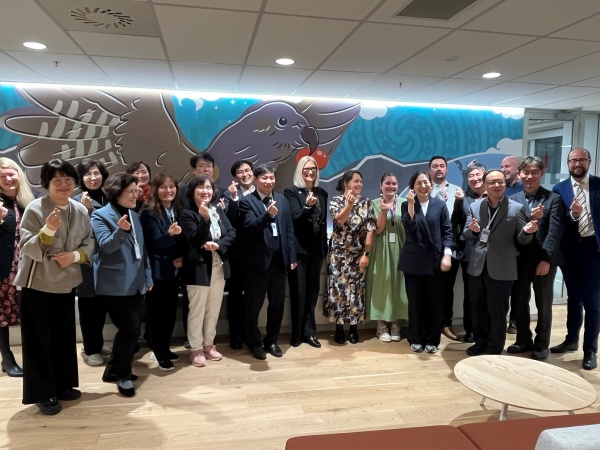
The delegation was formally welcomed to the Wellington with a Mihi Whakatau hosted by ENZ Chief Executive Amanda Malu, local staff and the Ministry of Education (MOE).
In Wellington, the delegation received a detailed briefing from the Ministry of Education and visited Scots College to observe the school in action.
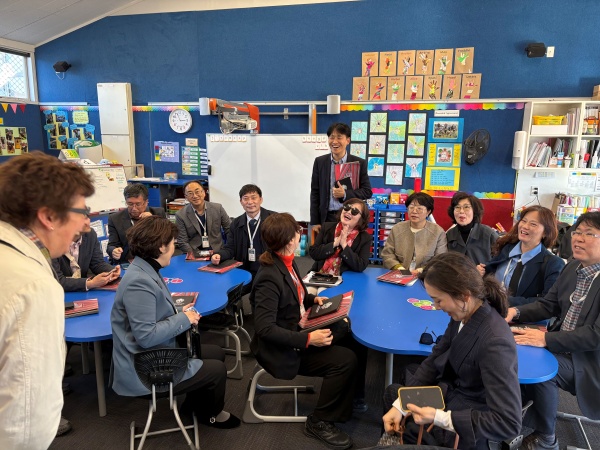
Scots College Junior School Principal, Rachael Huggins, showing the Incheon delegation around a primary-level classroom.
Down to Christchurch, the Incheon delegation visited Lincoln University to fine-tune the details of an MoU signed in January this year. The partnership arrangement will support five Incheon students to study at Lincoln University each year.
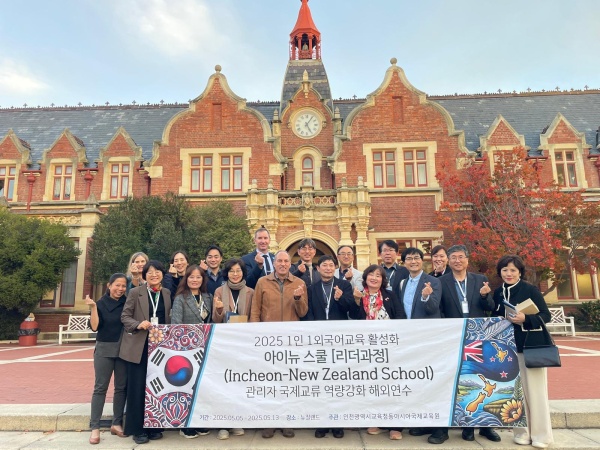
Incheon delegate members with Lincoln University staff from the Faculty of Agriculture and Life Sciences, Faculty of Agribusiness and Commerce, Academic Preparation and Pathways and International Operations.

Waitākiri Primary School Principal Mr. Andrew Barker introduces a Year 6 long-term international student from Korea to the delegates. She shared how much she has enjoyed her time at Waitākiri Primary School and expressed her sadness that her year at the school is coming to an end.
The group visited Shirley Boy’s High School and Avonside Girls High School in Christchurch, with a side-visit organised with Waitākiri Primary School.
Further South, a visit was arranged with Otago Polytechnic in Cromwell to understand the pathways to vocational education in New Zealand.
Director of Incheon Metropolitan Office of Education East Asia Global Education Institute, Jooyong Kim, said visiting New Zealand schools was a truly meaningful and deepened delegates understanding of the education system.
“We hope this visit will help strengthen the relationship between schools in New Zealand and Incheon”.
“We look forward to future collaborative projects with New Zealand institutions,” he added.
Several of the schools visited have expressed interest in deepening these new relationships, with planning underway to keep up the momentum and connect again at ENZ-led fairs and agent seminars in Korea later this year.
-
New Zealand strengthens its position as a study abroad destination for Brazilians
Figures from the 10th annual Brazilian Educational and Language Travel Association (Belta) Seal Survey 2025 show that New Zealand has climbed to the sixth most chosen destination by Brazilians studying abroad – compared to seventh place in 2024.
The survey ran from February to April this year and brought together insights from 586 education agencies and 1,780 students from across Brazil to understand trends, behaviours, and preferences in the international education sector.
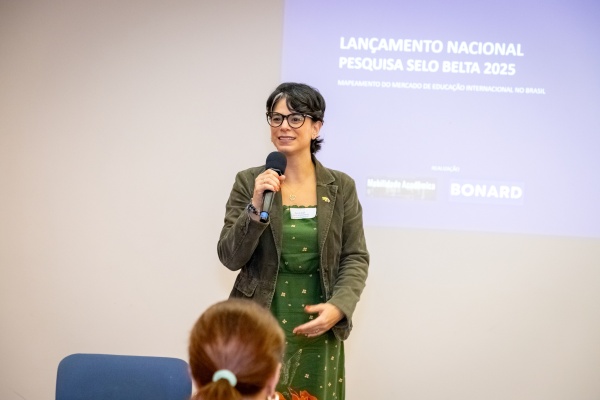
At the survey launch in May, ENZ Market Development Manager, Bruna de Natale, discussed the country’s growing relevance as a study destination for Brazilian students.
Speaking at the survey launch event in May, ENZ Market Development Manager, Bruna de Natale said "The data shows that New Zealand has not only maintained its appeal but has also strengthened its position on the radar of Brazilian students, especially amid uncertainties in other markets."
Dive into the data
Language courses remain the most sought-after programs, accounting for 91% of preferences among the agencies surveyed.
Why Brazilian students are choosing New Zealand
According to the data, the main factors driving the choice of New Zealand as a destination are:
-
High quality of life and safety
-
Academic excellence with a focus on innovation
-
Ease of obtaining a student visa
-
Permission to work while studying
-
Economically and socially stable environment
In addition, the growing demand for enriching cultural experiences, closer contact with nature, and the opportunity to develop socio-emotional skills has placed New Zealand in the spotlight — particularly among students who value a comprehensive education.
Additional insights from New Zealand-focused questions
A complementary survey, also conducted between February and April 2025 with 586 education agencies and 1,780 students across Brazil, highlighted specific factors influencing the decision to study in New Zealand.
The survey revealed that 75% of respondents who showed interest in New Zealand also considered it one of their top study destinations — ahead of countries like the United Kingdom and Canada. Students associate New Zealand with high-quality education, a good international reputation for its institutions, and globally recognised qualifications.
Additionally, New Zealand stands out for offering work opportunities during and after studies, socio-emotional skill development, and access to nature and outdoor activities — these factors align with current student preferences for holistic and life-enriching study abroad experiences.
If Brazil and/or any other Latin American country is part of your business plan for the 2025/26 financial year, please contact the in-market team via Latinamerica@enz.govt.nz.
-
-
From the CE: New Zealand higher education in the spotlight
Kia ora koutou,
Over the past few weeks, I have been abroad in both China and the United States promoting New Zealand education.
In late May I was delighted to attend my first NAFSA conference in San Diego, California. NAFSA is the world’s largest international education conference and this year it attracted over 8,000 attendees. ENZ supported the University of Auckland, Auckland University of Technology, University of Waikato, Massey University, Victoria University of Wellington, University of Canterbury, University of Otago and Whitecliffe College at the New Zealand Pavilion. Our collective involvement with such a significant event provided us with a strong platform to showcase New Zealand’s unique education offering to a global audience.
Following NAFSA, I travelled to Connecticut to meet representatives of the Mashantucket Pequot nation, during which I had a useful exchange on indigenous-to-indigenous education and engagement. It was a genuine privilege to be hosted by this small, resilient tribe, into which my whānau has whakapapa links.
Last week, I joined the Prime Minister’s Trade Mission to China alongside education delegates from UP Education, Te Pūkenga – New Zealand Institute of Skills and Technology, and Victoria University of Wellington.
The Trade Mission was an opportunity to support the tertiary education sector’s engagement with China which is our largest source market of international students. The visit also reinforced at the Government and sector level our strong bilateral education relationship.
One of our key deliverables was an education event to promote New Zealand’s reputation for world-leading research and high-quality education at Fudan University in Shanghai. Fudan is one of China’s most prestigious universities and while there we took the opportunity to celebrate 20 years of the New Zealand-China Tripartite Partnership Programme. A wonderful outcome from the event was the signing of an MoU between Victoria University of Wellington and Fudan University that will see the universities resume student exchanges and pursue research cooperation in public health, biotechnology and climate science.
In Beijing, we hosted New Zealand Education Connect and showcased New Zealand as a study destination to our key partners, and alongside Prime Minister Rt Hon Christopher Luxon, we officially launched New Zealand’s Country of Honour campaign for the China Annual Conference and Expo for International Education (CACIE) which will be taking place later this year.
Finally, this month the results of the latest QS World University Rankings 2026 were published. New Zealand ranked first in the English-speaking world and fifth globally for the overall quality of its higher education.
The 2026 results see New Zealand universities improve across academic reputation, citation per faculty, and international student indicators. New Zealand also ranks the highest globally in terms of employment outcomes among key English-speaking study destinations.
This is a fantastic result for our universities and reinforces New Zealand’s position as a high-quality and welcoming international education destination.
Whāia te mātauranga hei oranga mō koutou
Seek after learning for the sake of your wellbeing
Ngā mihi nui,
Amanda Malu
Chief Executive -
PM mission advances New Zealand and China education relationship
The New Zealand Education Connect event on 20 June at the New Zealand Embassy in Beijing brought together leading Chinese government representatives, institutional partners, education agents, and alumni to strengthen people-to-people links and celebrate collaboration.
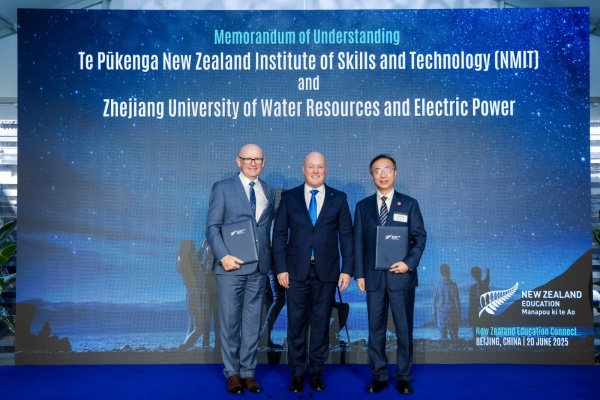
The event programme was packed, with nine Memorandums of Understanding (MoUs) signed between New Zealand and Chinese counterparts, and another MoU signed between Victoria University of Wellington and Fudan University on 19 June.
Providers from across the tertiary education sector signed the MoUs – with Victoria University of Wellington, Unitec, NMIT and UP Education’s University of Auckland International College and New Zealand Tertiary College formalising partnerships.
These agreements cover a mix of in-market delivery, joint programmes, and initiatives to grow student mobility between New Zealand and China.
This builds on the now over 60 approved joint education programmes and institutes recognised by the China Ministry of Education between New Zealand and Chinese institutions, and other education partnerships across early childhood education, vocational training, higher education, and research areas.
The New Zealand Education Connect event had senior leaders officially launching New Zealand’s Country of Honour campaign for the upcoming China Annual Conference and Expo for International Education (CACIE), China's largest platform for international education, due to take place in October this year.
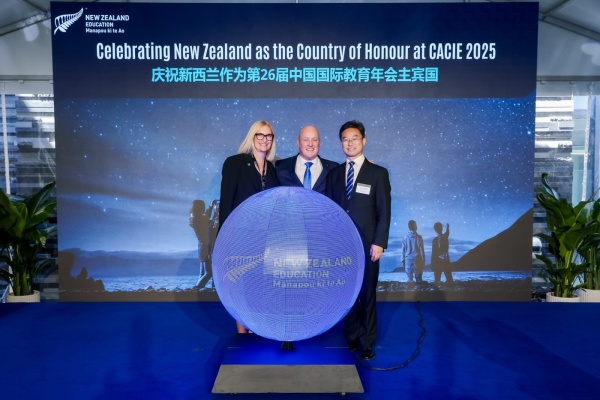
ENZ’s Chief Executive, Amanda Malu, launches the Country of Honour campaign for New Zealand at CACIE alongside Prime Minister Luxon and CEAIE’s Secretary General Jun Yang.
ENZ Chief Executive, Amanda Malu, said it’s exciting to see advancement of the partnerships New Zealand providers have built with their Chinese counterparts.
“We’re eager to see the outcomes of the new agreements formalised at New Zealand Education Connect and look forward to deepening our bilateral ties by leading a delegation to CACIE later this year,” she said.
Information on the registration process for New Zealand education providers to join the New Zealand Country of Honour events in October will be shared next month on ENZ’s event page.
The Country of Honour promotional video is available with Chinese subtitles on The Brand Lab.

